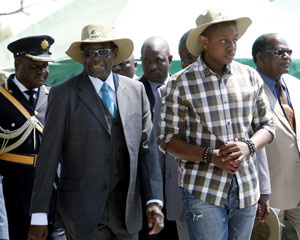
THREATS by President Robert Mugabe to retaliate against Western countries that imposed sanctions on his rule by targeting their companies here could scupper the country’s economic recovery, analysts have warned.
REPORT BY CAIPHAS CHIMHETE
Zimbabwe has been undergoing an economic crisis for over a decade, as the country failed to service its international debts, pay for power imports or feed its population.
It was expected that following his victory in the July 31 election, Mugabe would pursue a conciliatory approach towards the West to gain international goodwill, as the country seeks foreign investment to boost its failing economy.
But speaking at the burial of national hero retired Air Commodore, Mike Karakadzai last week, Mugabe threatened to clampdown on Western companies operating in the country in direct retaliation of sanctions imposed on him and his inner cabal.
“They [Western powers] have companies here and we have not imposed controls or sanctions against them, but the time will come when we will say tit-for-tat. You hit me, I hit you. You impose this on me, I impose this on you,” Mugabe said.
Mugabe was angered by the West which questioned his controversial July 31 poll victory that MDC president, Morgan Tsvangirai insists was rigged.
Britain has said the election could not be deemed credible without an independent investigation into allegations of voting irregularities, while the US said it would not loosen sanctions until there were signs of change in the country.
- Chamisa under fire over US$120K donation
- Mavhunga puts DeMbare into Chibuku quarterfinals
- Pension funds bet on Cabora Bassa oilfields
- Councils defy govt fire tender directive
Keep Reading
Analysts said Mugabe’s utterances further increased the political gulf between Zimbabwe and the West, at a time the country badly needed to re-engage the international community.
Political analyst, Dumisani Nkomo said Mugabe’s tit-for-tat approach was self-defeating because Zimbabwe has no capacity to defeat the West.
Mugabe’s threats, said Nkomo, further fuelled the mistrust and suspicion between Zimbabwe and the West.
“He [Mugabe] may have the will but lacks the capacity to defeat the West,” said Nkomo. “His threats do not send a good signal to the international community, at a time when we must be re-engaging those countries.”
The 89-year-old president singled out British and American companies for the retaliatory attacks. Already, banks such as Standard Chartered and Barclays Plc have been subject of debate as they are ear-marked for indigenisation, where they are required to dispose of at least 51% of their shareholding to locals.
A UK-based Zimbabwe commentator, who requested anonymity, blamed Mugabe’s utterances on his advanced age.
“We all know there is a policy of indigenisation, but there was no need to make direct threats to countries such as Britain and America. He should have been diplomatic about it,” said the analyst. “It could be age taking its toll on him.”
The policy of indigenisation, which requires all foreign firms worth US$500 000 and above to dispose of controlling shareholding to locals, has not been popular with Western countries.
Commenting a few days after the July 31 elections, Australia’s ambassador to Zimbabwe Matthew Neuhaus said Zimbabwe was a very risky place to invest.
He said Australia’s view of Zimbabwe for the past two years had been one of a cautious “wait and see” approach.
But Zanu PF spokesperson, Rugare Gumbo said the retaliation that Mugabe talked about was necessitated by the behaviour of Western countries. He dismissed the notion that Mugabe’s threats would drive away investors.
“We are on a growth path now and investors are actually keen to come and invest in the country,” said Gumbo. “They [investors] are just waiting for us to set up a new government.”
Gumbo said most countries were impressed that Zimbabwe held peaceful, fair and credible elections and even after the polls “there is still peace and stability”.
America imposed economic sanctions on Zimbabwe through the Zimbabwe Democracy and Economic Recovery Act (Zidera) in 2001, which saw the country failing to access finance and credit facilities.
America accused Mugabe of gross human rights violations.
‘Mugabe’s threats will harm the country’s image’
University of Zimbabwe law lecturer, Greg Lennington said Mugabe’s threats were likely to dent the country’s image internationally. He said such statements also drove away potential investors.
“It will harm the country’s economy,” said Lennington. “This will also affect tourism, as tourists will shun the country.”
Zimbabwe and Zambia have just co-hosted the United Nations World Tourism Organisation (UNWTO) general assembly and used the meeting to lure foreign tourists.










